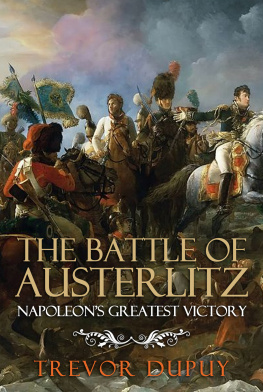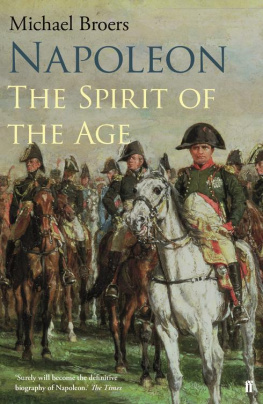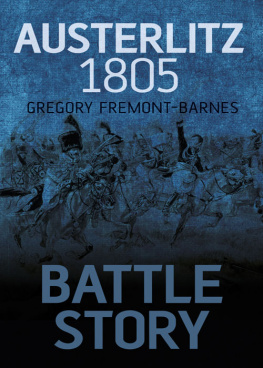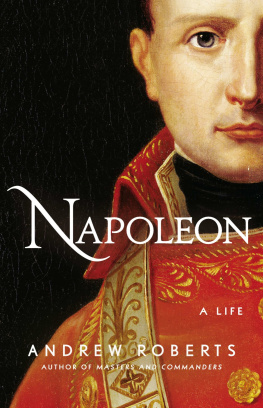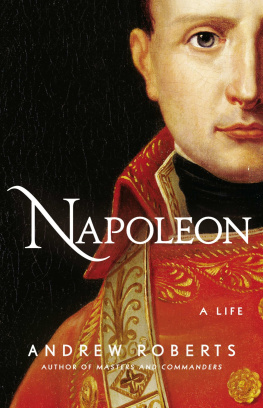The Battle of Austerlitz: Napoleons Greatest Victory
Trevor N. Dupuy
Copyright Trevor N. Dupuy 1968
The right of Trevor N. Dupuy to be identified as the author of this work has been asserted by him in accordance with the Copyright, Designs and Patents Act, 1988.
First published in the United Kingdom in 1968 by Macmillan Ltd.
This edition published in 2015 by Endeavour Press Ltd.
For Fielding
Table of Contents
Chapter One To Austerlitz from Ajaccio
Before tomorrow night that army will be in my power!
The short but impressive figure in the plain gray, travel-stained greatcoat spoke vehemently, almost gleefully, to a group of more colorfully uniformed men gathered in a semicircle behind him. He swept his arm in an arc to the east, pointing across a narrow valley to a broad plateau about two miles away. It was a bright, clear day and the group of officers could distinctly see the masses of troops gathering on the opposite heights. Their breath misting in the cold, crisp air, several of the officers raised spyglasses to their eyes, the better to see the columns of Russian and Austrian troops streaming through and around the distant town of Austerlitz to join those already on the plateau. Now, as the officers stamped their feet to keep warm, their dynamic leader turned to face them.
He was Napoleon Bonaparte, Emperor of the French. He and his marshals and senior divisional generals had just finished a chilly lunch near the crest of Zurlon Hill, overlooking his own army stretched out for several miles to the north and south. During the meal he had been explaining his plans. Afterward, Napoleon had led the generals to the top of the hill, to show them that the enemy was acting just as he had expected, assuring the success of his plan. Below, there were puffs of smoke and the sound of firing as French and allied skirmishers clashed.
Now the emperor looked intently at his marshals and generals, a broad smile on his thin lips. Tomorrow, he repeated, that army will be mine.
It was December 1, 1805. Here in central Moravia, in the rolling, open country between the cities of Brnn and Austerlitz, the decisive moment was almost at hand. For Napoleon, it was the culmination of three months of careful planning, rapid movement and vigorous action. The next day, as the emperor well knew, would be the first anniversary of his coronation. It would be, he realized, a violent and bloody celebration, but he was certain that it would be a glorious one for him and for his Empire.
In late August and early September, Napoleon had put his divisions in motion from their bases in northern France. Now, after overrunning southern Germany and occupying Vienna, capital of the Hapsburg emperor of Austria and the Holy Roman Empire, he had led a portion of his army into Moravia. Here in the heart of central Europe, sixty miles north of Vienna, his troops were scattered over an area of several miles, with no apparent line of retreat to France except through Vienna.
Napoleon felt certain that his enemies would think that he was dangerously isolated and exposed to attack by their more numerous forces. For more than a week he had done everything in his power to encourage the emperors of Russia and Austria and their generals in that belief. He had withdrawn his outposts from Austerlitz, pretending to avoid battle while he was in fact secretly preparing for it. And now, with the foe gathering near Austerlitz and on the Heights of Pratzen, he knew that he had completely fooled the enemy. Secretly and quietly he had gathered his scattered troops around him, east of Brnn. He had carefully prepared an alternate line of retreat through Bohemia, just in case the enemy avoided the trap. But now he was confident that his carefully planned retreat line would never be used.
By early afternoon of December 1, as Napoleon and his senior officers ate lunch on Zurlon Hill, he had gathered about 65,000 men, prepared for battle the following day. Only Marshal Louis N. Davout with two divisions of the Third Corps, perhaps 8,000 additional men, had not yet arrived. They had a long way to come some of them from as far as Vienna. But Napoleon knew Davout; that reliable commander would arrive in time for the battle.
Now, almost gaily, the emperor dismissed his generals, sending them back to their commands to issue their orders and to prepare for the battle. He ordered them to meet him again on the hill by seven thirty the following morning. Napoleon himself mounted his white horse. Accompanied by a small group of his Mameluke Guards, he galloped off to make an inspection of his entire army before the early December dusk.
From the Isle of Corsica
The leader of this army had been born Napoleone Buonaparte on August 15, 1769, in the city of Ajaccio on the rocky island of Corsica off the coast of France in the Mediterranean Sea. He was the second child of Carlo and Letitia di Buonaparte, whose noble ancestors had come to Corsica from Italy more than two hundred years earlier. France had bought Corsica from Genoa (an Italian city-state) the year before Napoleone was born. His birth as a French citizen provided a chance for the exceptionally intelligent lad to get a better education in France than would have been possible in Corsica.
Napoleone entered the military school at Brienne in 1779. There the moody lad, smaller than most of the boys his age, kept much to himself. He was called Napoleon Bonaparte, in the French fashion. His schoolmates teased him, calling him straw-in-the-nose because he spoke French with a peculiar accent. But he stood up for himself and they respected him for his spirit.
After five years in the military school, Napoleon was chosen with four other good students in his class to attend the French armys cadet school in Paris. When he graduated a year later, in 1785, young Bonaparte joined an artillery regiment as a second lieutenant. Now barely five feet tall, though still growing, the shy young officer devoted himself to military studies, and particularly to the science of gunnery.
That year Napoleons father died. Napoleon took on the responsibility of straightening out the family finances. As second son, he was not required to do this, but he had much more drive and ability than his elder brother, Joseph. For the next four years, Napoleon spent much of his time on leave at home in Corsica.
Then, on July 14, 1789, came an event which shook the world. The people of France rose against their king, Louis XVI, and established a republican form of government. It was the beginning of the great upheaval known as the French Revolution. For several years France was in turmoil, as royalists fought bitterly against the republicans in efforts to restore Louis to power.
The neighboring countries of Europe soon began to interfere in this fierce struggle going on inside France. Most of the other European kings wanted to help Louis and his family regain control of France. These rulers felt that the common people had no right to remove a king from his throne; they wanted to destroy the new republican government before ideas of liberty and revolution spread to their own nations. Some of them also thought that the troubles inside France would give them an opportunity to seize French territory, increasing the powder of their own countries at the expense of France.
The Siege of Toulon
As a result of these attacks by foreign countries, most of the French people united around their new government and fought vigorously to repel the invaders and suppress the royalists inside France. Young Lieutenant Bonaparte was a strong republican sympathizer, and he responded loyally when his regiment was sent to restore order in the troubled region of southeastern France. By early 1793 he had risen in rank to become a major of artillery.

